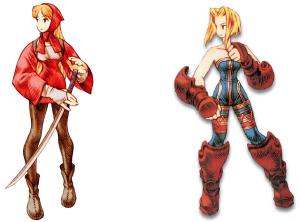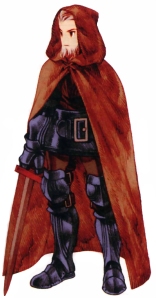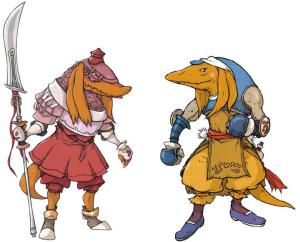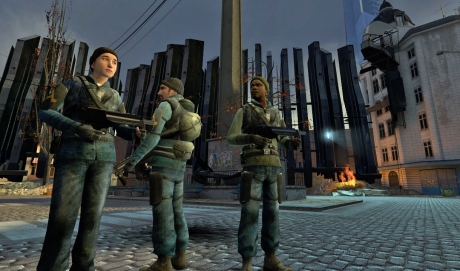At a friend’s encouragement I’ve decided to finally tackle Final Fantasy Tactics. Occasionally I’ll find myself really latching onto a quirk in a game that makes it seem unique. Many of these little quirks I jump all over are the kind of thing I think developers ought to try more often. For instance, I’ve written about how effective it can be when games make the player use resources outside of the game to keep track of the mechanics (“A Defense of the Walkthrough.” PopMatters. Jul 23 2012); I’ve written about how refreshing it is that Tryst makes the player care about their units as more than just war resources with purely pragmatic means (“The Value of the Soldier.” PopMatters. Oct 9 2012); most recently, I’ve written about how the more a game requires the player to put some effort into moving the game forward, the more connected they become to the characters and the narrative (“Challenge is Conflict: How Difficulty Makes Game Narratives Work.” Medium Difficulty. Nov 6 2012). Final Fantasy Tactics does all of these things, but it is especially effective that last one. It makes the player to connect with their party by demanding that they put some effort into their development.
I was a little leery when I first hopped into the game because the hour-and-a-half of poorly designed tutorial seemed only to scratch the surface of the complicated mechanics. I’ve been through some streamlined successors of FFT, but Tactics proper comes loaded with a merciless difficulty curve. Once I got into it, however, I found the challenge rewarding, the overtly Shakespearean melodrama endearing and deep political gaming interesting and complicated (obtuse, actually, though it works in the game’s favour). Additionally, I was intrigued by the dynamic of the protagonist Ramza and his band of soldiers, most of whom are randomly generated sprites with no speaking lines.
Ramza and his party go from location to location, learning more about the world of Ivalice and the war brewing therein. The player engages in small conflicts fought by Ramza and four of his allies. Each sprite moves and attacks on their turn, gaining experience, levelling up and learning abilities in various “job classes.” As they master more abilities and carry certain skills from one class to another, they specialize or round out according to the player’s style and tactics. In the beginning of the game, Ramza’s party consists of only 4 characters with random names and stats. For me, one of those random characters was Agnes, and she happened to roll very strong stats.

The concept art for the female ninja (left) and monk (right) job classes, which Agnes split the game between
Naturally, because she began with strong stats, she progressed into one of the strongest members of Ramza’s team. She was a key player in every major fight in the game’s plot and she was present for almost all of the level grinding in between. She mastered her classes before any of the other characters and she was crucial in every fight she participated in. Her role in battle remained fairly constant as a front line bruiser that occasionally took on tanking duty when needed. But something odd happened near the end of the game, when plot-relevant characters started joining my team.
The warm-hearted engineer, Mastudio, and the stalwart holy knight, Agrias, had too many special abilities to be ignored, and they fit in with my party nicely. But after them, I refused to let any more plot-relevant character participate in my fights because it meant I would have to remove Agnes from my team. Even though she was just a basic, blank slate unit with no influence on the story and no special abilities, she was too important to the party to warm the bench. After all, she had earned her place in the front lines; I put enough effort into her to make sure of that. When divine swordsmen, Orlandu who ludicrously overpowers any other potential ally in the game, offered me his allegiance, I was actually fairly upset.

Fuck you, Orlandu, and your immortal demigod powers.
I watched Agnes go from an unskilled grunt into a refined super soldier that perfectly suited a specific combat role. More than that, Agnes was with Ramza from the beginning, she’d seen every fight that Ramza had and chose to stick with him. Ramza is painted as one of the few moral people in an immoral world, he’s the lone figure of justice in a society run by self-interested aristocrats. But if Ramza is the good guy, than Agnes deserves just as much credit for having the conviction to stay with him.
The conditions for keeping party members from leaving are pretty easy to meet, but after having her in my party for so long and depending on her so much, I started imagining Agnes as Ramza’s silent cohort. A courageous ally with unquestioning loyalty whose resolve awakened exceptional combat prowess that otherwise would have remained latent. She had a higher bravery stat than anyone else in the party but only a moderate faith stat; which constructed in my mind an agnostic, worldly woman with an incorruptable ideal and an unshakable strength of mind. Agnes became as key to the journey as any “actual” character, she required incredible upkeep and without her on the front line I wouldn’t have stood a chance in many of the game’s challenging fights. She was a part of the journey and it only took a few steps into it for me to see her as an inextricable part of Ramza’s quest.
It could just be my imagination wrestling a game’s mechanic into its story to align it with my approach to criticism, but I did the same with Tactics’ spiritual sequel on the Game Boy Advance, Final Fantasy Tactics Advanced (“Anti-Escapism and Final Fantasy Tactics Advance.” PopMatters. Feb 9 2012). In my first playthough of that game I had a pair of Bangaas that I took to every fight named Mikhail and Nikolai, who may or may not have developed a heart-warming romance between battles that would put any Bioware opus to shame. It was the same thing in that instance: I needed those characters to succeed, they became stronger and facilitated further success, and before long they were as much a part of the story as the main characters as far as I was concerned. But even if it is me reaching too far into randomly-generated code for meaning, the effort required to build a tactical unit out of random sprites fosters a special kind of emotional connection.

I was moved. So what?
I had a similar feeling toward some of the NPCs that joined Freeman late in Half-Life 2. They were just random citizens that offered to take up arms with Freeman as he gallivanted across the ruined cityscape. They weren’t a huge help, but these NPCs were useful in their own ways, even if just to pull aggro. They were also really tough to keep alive. Sometimes they would rotate out at a checkpoint, and I would feel good about getting them to safety. But if they died, they would not be replaced. The game kept track of who was still following you, and if the number dropped (and it would), the game would become more difficult. And it would be your fault. These NPCs were always happy to see you, always willing to fight alongside you. When they were injured they held their guts until a medic patched them up, when they died the next firefight would be harder. The player was the commander responsible for them. It worked.
Contrast that with the NPCs in Halo, who seemed to be there mostly to steal guns and cars from. Master Chief could kill them with no consequence, or he could run off without them. They were seldom any help and when they did figure out which end to point their guns they would shout smartass one-liners like “Hey, that was MY kill.” They were there only to remind the player how awesome their Spartan was compared to the average, enlisted soldier. There was nothing to get attached to, they didn’t change the next obstacle and they required no effort to keep alive (because they would often die or flee in the first few seconds of a battle).

A group of rebels from Half-Life 2
So, to reiterate, the more their time and effort a game makes its player put into a character, the more of character they become, even if they are just a cluster of stats. I would love to see some mechanic where an NPC develops a personality based on the amount of time the player spends on them and what sort of role the player expects out of them, but that might be getting greedy. Even if the game doesn’t do that, just needing characters as resources that require time is enough to foster the player’s connection to them.
Further reading: Fawkes. “Final Fantasy Tactics and the search for balance in SRPGs.” Feathered Melody. July 17 2011.
Hamilton, Kirk. “Why Everybody Loves Final Fantasy Tactics.” Kotaku. Jan 1 2013.
Shea, J. “Analysis: Final Fantasy Tactics.” Exploring Believably. Feb 6 2011.
This reminds me of my girl Diana, a Priest with a gun and the Knight’s break abilities. I always imagined her as an apprentice Priest-in-training, who’s friendship (or love interest?) with Ramza led her to follow him and discover the lies of her beloved Church, and stuck with him to the bitter end trying to expose said lies. She was even the one who got the final blow on Hashmalum with Holy, showing her disdain for the plots of demons who attempted to use the public. So now whenever I play the game, I always try to roll a generic named Diana, so I can rebuild my favorite girl all over again.
This reminds me of my girl Diana, a Priest with a gun and the Knight’s break abilities. She started off as an apprentice priestess at Ramza’s school, and eventually took the lies of the Church to the face and decided to fight the good fight. She kept the party upright, and even was the one who killed Hashmalum with a blast of Holy. So now every time I play the game, I try to roll a generic named Diana, just so I can rebuild my favorite girl.
This was a great article, and I’m going to bookmark it to remind me of an important element of game design. Reading this reminds me of Yahtzee Croshaw’s complaint about Agnes’ foil, the Natalya Simonovas of the world, who we are asked to care about before the player has had a chance to develop a meaningful relationship with them. The story simply demands that we pretend that we care about them.
Agnes is the opposite of this. There’s no story-based reason to care about her, and in terms of gameplay, prioritizing her kind of hurts you, but because the player has a relationship with this character we want to field her instead of Orlandu.
I’ve played FFT many times and had this experience many times and it’s great to have it expressed so clearly.